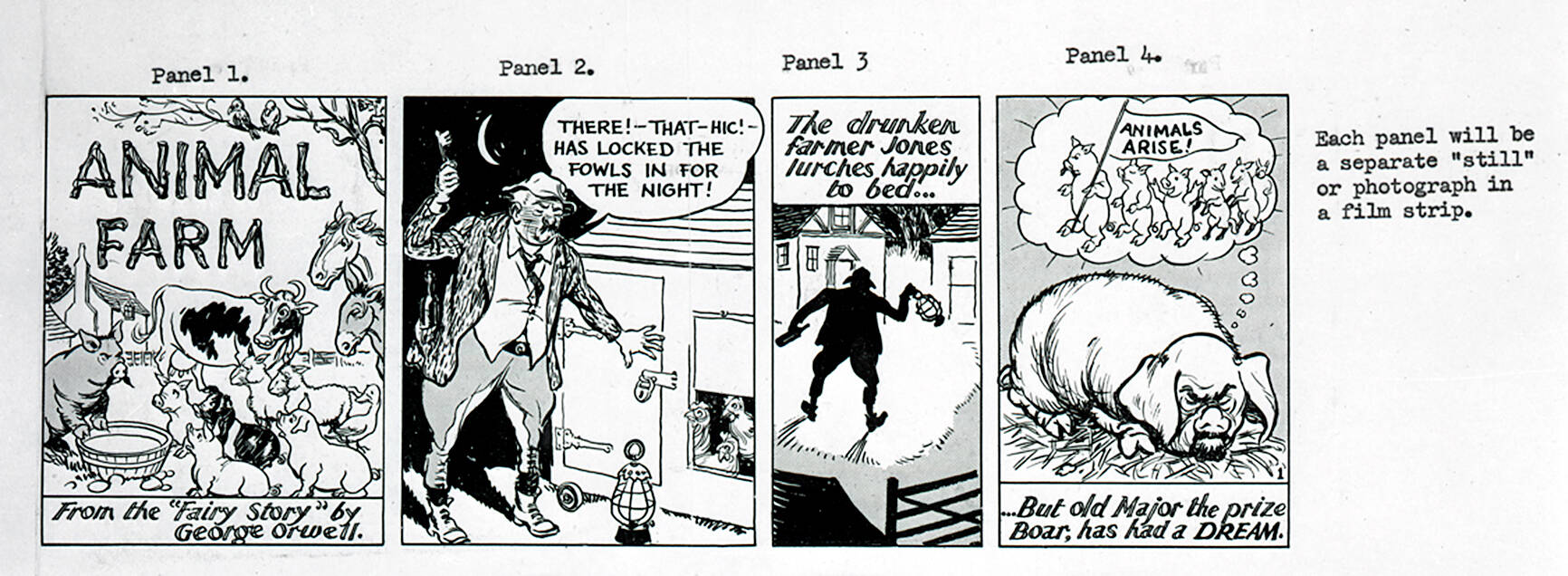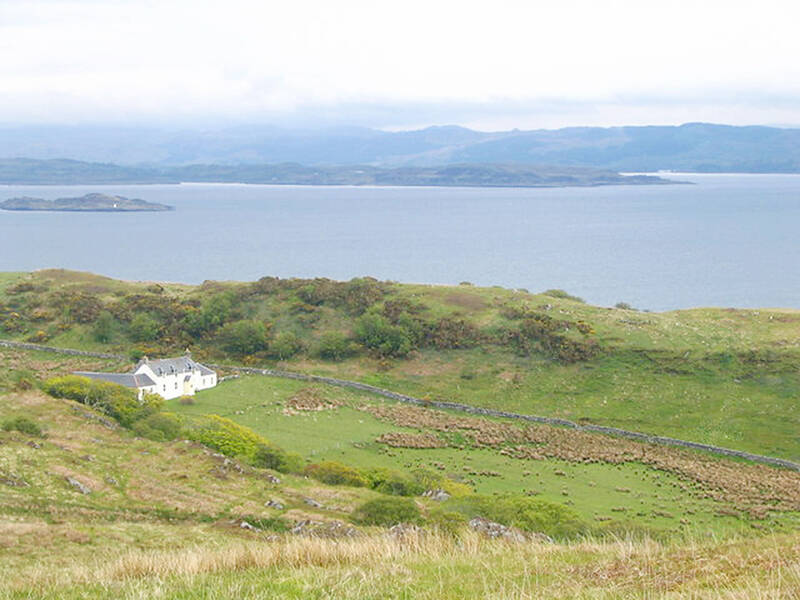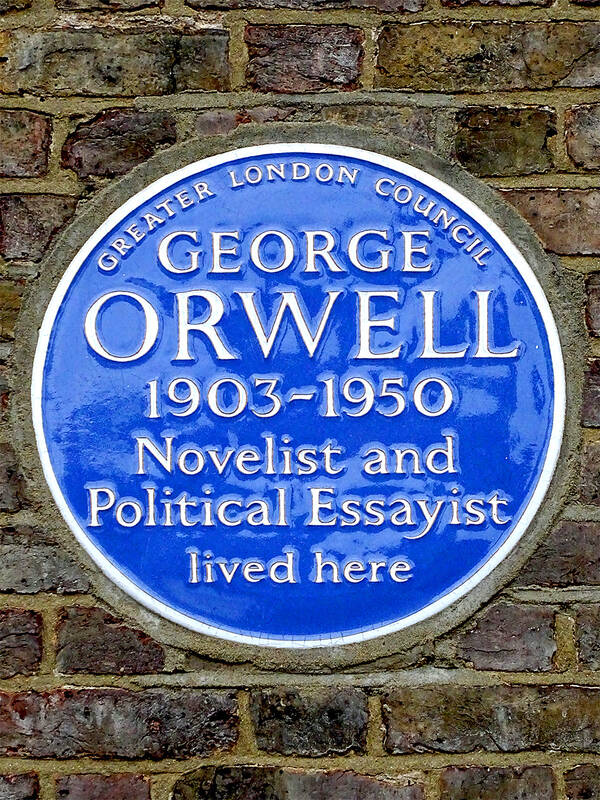George Orwell was in his mid-40s, enjoying the peak of his fame after the publication of Animal Farm. Yet his mood was low after the death of his wife, Eileen. He was in Wales with his friend Arthur Koestler, where they were joined by 27-year-old Celia Kirwan. She and Orwell spent the night together, with Kirwan commenting afterwards that the author made love “Burma-sergeant fashion,” clearly in a hurry and simply saying: “Ah, that’s better” before turning over.
This story is included in a recent book, Wifedom, about the marriage of Orwell and his first wife, Eileen O’Shaughnessy. However, the author is now at the center of a row about the veracity of some of the claims that she makes, including this one.
This story of Orwell and Kirnan’s sexual encounter is one of the passages that Viking, part of Penguin Random House, has agreed to correct, as well as another that tells of a trip where the pair met on the Scottish island of Jura. One more is the location of Orwell’s country of birth, which is cited as Burma, not India.

Photo courtesy of Wikimedia Commons
Funder has imposed a modern feminist view on a marriage of 80 years ago. Wifedom is written by Anna Funder, winner of the top nonfiction prize, the Samuel Johnson, now known as the Baillie Gifford, for Stasiland. When Wifedom was published late this summer, it garnered widespread praise, including a review in the Observer in which writer Stephanie Merritt described it as a “vital, if incomplete, portrait of a woman whose unseen work was instrumental in the creation of books that became cornerstones of 20th-century literature.”
The Times in its review acknowledges that while “not everyone will feel easy about the passages in which Funder allows herself to imagine what is going on inside Eileen’s head,” most readers will be “simply thrilled — and shaken — by this passionately partisan act of literary reparation.”
However, the claims in the book have left some readers unhappy. Among them are two children of two of Orwell’s closest friends, who have written to the publishers in anger about errors and tone.

Photo courtesy of Wikimedia Commons
“Funder paints Eileen as a bullied woman suffering at the hands of a misogynist,” says Quentin Kopp, whose father Georges was Orwell’s commander during the Spanish civil war.
Kirwan’s daughter, Ariane Bankes, an author herself, says: “I know from letters between my mother and her twin sister, Mamaine, who was married to Koestler, that despite Orwell’s advances, she never wanted sex with Orwell, and never had any.”
Bankes also told Viking that Funder erroneously wrote that her mother went to Jura in the late 1940s to stay with Orwell. Funder told the Observer: “We’ve agreed to remove the references to Celia being a lover of Orwell and visiting him on Jura.”

Photo courtesy of Wikimedia Commons
University educated, O’Shaughnessy had various jobs before meeting Orwell in 1935 and marrying him the next year. She followed him to Spain, working for the Independent Labour party (ILP) and helping her husband on Homage to Catalonia. During the second world war, she was employed by the Ministry of Information.
In 2020 Sylvia Topp published a much-praised biography about O’Shaughnessy, in part inspired by recently found letters between Eileen and her best friend Norah Myles. Yet Funder’s book, published two months ago, is subtitled “Mrs Orwell’s Invisible Life.” Bill Hamilton, who is Topp’s literary agent and the executor of Orwell’s estate, is unhappy about this.
“Sylvia’s book is not adequately credited by Anna Funder,” he says.

Photo courtesy of Wikimedia Commons
Funder rejects this. “I do express my debt to Topp’s work,” she says. There are references to Topp in notes at the back of her book.
Jean Seaton, director of the Orwell prize, is also annoyed.
“Funder argues that Orwell’s previous biographers did not give Eileen a voice. They mentioned her, but not until the letters between Eileen and Norah emerged was a fuller picture possible.”
On several occasions in Wifedom, Funder makes remarks about Orwell’s “six previous male biographers” not writing more about Eileen.
“It would have been possible for them,” says Funder. “Like her work at the ILP headquarters in Barcelona, saving her husband’s life during the war in Spain and later helping him with Animal Farm.”
Funder is also aggrieved that Orwell referred to “my wife” 37 times in Homage to Catalonia rather than using her name.
However Kopp, chair of the Orwell Society, contends that Orwell did not mention Eileen’s name “partly to protect her in a dangerous situation.”
Eileen died aged only 39 in March 1945 — a year after the couple had adopted a young child, Richard. It was after this that Orwell began looking for sexual partners, claims Funder.
“Pouncing again, and proposing to at least four women, including Kirwan,” she writes.
Just three months before he died in January 1950, Orwell married Sonia Brownell, on whom Julia, the heroine of Nineteen Eighty-Four, is believed to be based.
A strong theme of Wifedom is the patriarchy.
“Men who believe they can behave badly while delegating to the women who support them,” Funder says.
Bankes, however, counters: “Eileen did what she did for Orwell out of choice. She was not starry-eyed about him.”
Kopp argues that Funder has “imposed a modern feminist view on a marriage of 80 years ago. She has also decided to attack Orwell, for whatever reasons, in a book which is destructive of him and his reputation.”
Funder accepts some errors and that there are “differences of opinion and interpretation.”
But she stands her ground on the central thesis of the book.
“Orwell was sadistic and misogynistic, but such a powerful writer in part because of his failings.”

In the March 9 edition of the Taipei Times a piece by Ninon Godefroy ran with the headine “The quiet, gentle rhythm of Taiwan.” It started with the line “Taiwan is a small, humble place. There is no Eiffel Tower, no pyramids — no singular attraction that draws the world’s attention.” I laughed out loud at that. This was out of no disrespect for the author or the piece, which made some interesting analogies and good points about how both Din Tai Fung’s and Taiwan Semiconductor Manufacturing Co’s (TSMC, 台積電) meticulous attention to detail and quality are not quite up to

April 21 to April 27 Hsieh Er’s (謝娥) political fortunes were rising fast after she got out of jail and joined the Chinese Nationalist Party (KMT) in December 1945. Not only did she hold key positions in various committees, she was elected the only woman on the Taipei City Council and headed to Nanjing in 1946 as the sole Taiwanese female representative to the National Constituent Assembly. With the support of first lady Soong May-ling (宋美齡), she started the Taipei Women’s Association and Taiwan Provincial Women’s Association, where she

Chinese Nationalist Party (KMT) Chairman Eric Chu (朱立倫) hatched a bold plan to charge forward and seize the initiative when he held a protest in front of the Taipei City Prosecutors’ Office. Though risky, because illegal, its success would help tackle at least six problems facing both himself and the KMT. What he did not see coming was Taipei Mayor Chiang Wan-an (將萬安) tripping him up out of the gate. In spite of Chu being the most consequential and successful KMT chairman since the early 2010s — arguably saving the party from financial ruin and restoring its electoral viability —

It is one of the more remarkable facts of Taiwan history that it was never occupied or claimed by any of the numerous kingdoms of southern China — Han or otherwise — that lay just across the water from it. None of their brilliant ministers ever discovered that Taiwan was a “core interest” of the state whose annexation was “inevitable.” As Paul Kua notes in an excellent monograph laying out how the Portuguese gave Taiwan the name “Formosa,” the first Europeans to express an interest in occupying Taiwan were the Spanish. Tonio Andrade in his seminal work, How Taiwan Became Chinese,